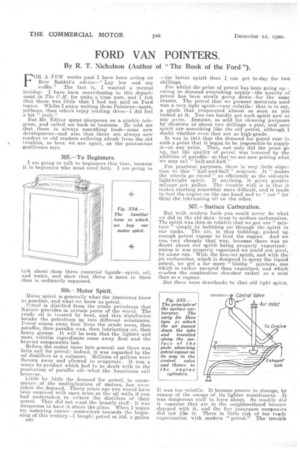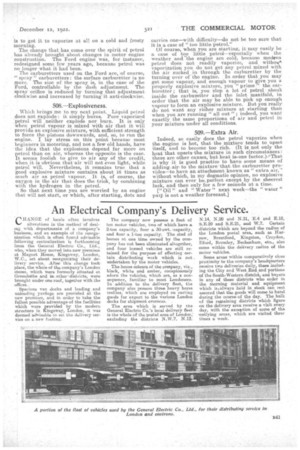FORD VAN POINTERS.
Page 24

Page 25

If you've noticed an error in this article please click here to report it so we can fix it.
By R. T. Nicholson (Author of 4: The Book of the Ford").
FOR A FEW weeks past I have been acting on Brer Rabbit's advice—" Lay low and say nuffin." The fact is, I wanted a mental holiday. I have been contributing to this department in The O.M. for quite a time now, and I felt that there was little that I had not said on Ford topics. Whilst I enjoy writing these Pointers—more, perhaps, than others enjoy reading them—I did feel a bit ' stale."
But Mr. Editor spent ninepence on a nimble telegram, and called me back to business. He told me that there is always something fresh—some new development—and also that there are always new readers or old readers suffering afresh from the old
a troubles, so here we .are again, as the pantomime gentleman says.
505.—To Beginners.
I am going to talk to beginners this time, because it is beginners who most need help. I am going to
talk about those three essential liquids—spirit, oil, and water, and show that there is more in them than is ordinarily supposed.
506.--Motor Spirit.
Motor spirit is generally what the Americans know as gasoline, and what we know as petrol. Petrol is distilled from the crude petroleum that Nature provides in certain parts of the world. The crude oil is 'treated by heat, and this distillation breaks the petroleum up into different substances. Petrol comes away first from the crude mass, then paraffin, then paraffin wax, then lubricating oil, then heavy grease. It will be seen that the lighter and more volatile ingredients come away first and the heavier components last.
Before the motor came into general use there was little call for petrol: indeed, it was regarded by the oil distillers as a nuisance. Millions of gallons were thrown. away and allowed to evaporate. It was a waste by-product which had to be dealt with in the production of paraffin oil—what the Americans call kerosene.
Little by little the demand for petrol, in consequence of the multiplication of motors, has overtaken the demand. Thirty years ago you would have been received with open arms at the oil wells if you had undertaken to relieve the distillers of their petrol. They did not want the beastly stuff : it was dangerous to have it about the place. When I began my motoring career—somewhere towards the beginning of this century—I bought petrol at lad, a gallon
B4,0 —far better spirit than I can get to-day for two shillings.
For whilst the price of petrol has been going up— owing to demand overtaking supply—the quality of petrol has been slowly going down--for the same reason. The petrol that we pioneer motorists used was a very light Spirit—very volatile: that is to say, a spirit that evaporated almost as soon as you looked at it. You can hardly get such spirit now at any price. Benzine, as sold for cleaning purposes by chemists at about two shillings a pint, and aero spirit are something like the old petrol, although I doubt whether even they are as high-grade.
It was in 1915 that the demand for petrol rose to such a point that it began to be impossible to supply it—at any price. Then, not only did the price go up, hut the quality of petrol was lowered by the addition of paraffin—so that we are now getting what we may call half-and-half."
For practical purposes, there is very little objection to this " half-and-half" mixture. It " makes the wheels go round" as efficiently as the old-style lightweight spirit.. If anything, it gives greater mileage per gallon. The trouble with it is that it makes starting sorneWhat more difficult, and it tends to foul the engine on the one hand and to " cut" (or thin) the lubricating oil on the other.
507.— Surface Carburation.
But with modern fuels you could never do what we did in the old days—trust to surface carburation. The spirit was then so volatile that we got our "mixture " simply by bubbling air through the spirit in our tanks. The air, in thus bubbling, picked up enough petrol vapour to feed the engine. And we ram very cheaply that way, because there was no doubt about our spirit being properly vaporized: unless it was properly vaporized we could not start, let alone run. With the heavier spirit, and with the jet carburetter, which is designed to spray the liquid petrol, we get a, far more " blobby: mixture, one which is rather sprayed than vaporized, and which' reaches the combustion chamber rather as a mist than as a vapour.
But there were drawbacks to that old light spirit.
It was too volatile. It became poorer in storage, by reason of the escape of its lighter constituents. It was dangerous stuff to have about. So readily did it vaporize that air in the neighbourhood became charged with it, and the fire insurance companies did not like it. There is little risk of too ready vaporization with modern " petrol." The trouble
is to got it to vaporize at all on a cold and frosty morning.
The change that has come over the spirit of petrol has already brought about changes in motor engine construction. The Ford engine was, for instance, redesigned some few years ago, because petrol was no longer what it had been. The carburetters used on the Ford are, of course, " spray " carburetters : the surface carburetter is no more. The size of the spray is, in the case of the Ford, controllable by the dash adjustment. The spray orifice is reduced by turning that adjustment clockwise and increased by turning it anti-clockwise.
508.—Explosiveness.
Which brings me to my next point. Liquid petrol .does not explode : it simply burns. Pure vaporized petrol will neither explode nor burn. It is only when petrol vapour is mixed with air that it will provide an explosive mixture, with sufficient strength to force the pistons downwards, and, so, to run the engine. I lay stress on this point because most beginners in motoring, and not a few old hands, have the idea that the explosions depend far more On petrol than on air, whereas the opposite is the case. It seems foolish to give to air any of the credit, when it is obvious that •air will not even light, while petrol will. Nevertheless, it remains true that a good explosive mixture contains about 16 times as much air as petrol vapour. It is of course, the oxygen in the air that does the trick, by combining with the hydrogen in the petrol.
So that next time you are worried by an engine that will not start, or which, after starting, dots and carries one—with difficulty—do not be too sure that it is a case of " too little petrol."
Of course' when you are starting, it may easily be a ease of too little petrol—especially when the weather and theengine are cold, because modern petrol does not readily vaporize and withole vaporization you do not get any petrol mixed with the air sucked in through the carburetter by the turning over of the engine. In order that you may get some vapour, and enough vapour to give you a properly explosive mixture, you prime " the carburetter ; that is, you. slop a lot of petrol abotit inside the carburetter and the inlet manifold, in order that the air may be able to pick up enough vapour to form an explosive mixture. But you really do not want any 'idler mixture at starting than when you are running" all out " ; indeed, you want exactly the same proportions of air and petrol in your mixture under all conditions.
509.—Extra Air.
Indeed, so easily does the petrol vaporize when the engine is hot, that the mixture tends to upset itself, and to become too rich. (It is not only the heat that upsets•the mixture in such circumstances: there are other causes,.but heat itnone factor.),'That is why it is good practice to have some means of adding air to the mixture •that the carburetter provides—to have an. attachment known as" extra air," without which, in my dogmatic opinion, no explosive mixture can ever be. perfect except by the sheerest luck, and then only for a few seconds at a time.
[" Oil " and " Water " next week—the "water " part, is not a weather forecast.]






























